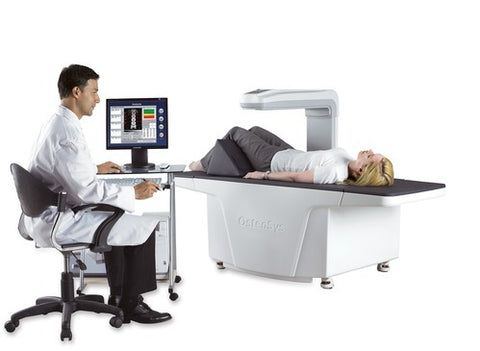
How to Increase Bone Density Naturally
Your bone density starts its steady decline after your 30th birthday. By 60, half of all women and a quarter of all men are at very high risk for Osteoporosis. We will cover ways to increase your bone density naturally that work at any age.
Why is Bone Density Important?
Strong bones are the foundation of your overall health. They protect your organs and muscles, as well as store calcium. Surprisingly enough, your bones are always changing. When we are young, our bones change much more rapidly. This means that new bone replaces old bone at a faster rate. This process begins to slow down when we near the age of 30.
If you have weak bones, you will notice that you may not be able to perform daily activities or will have a heightened risk if you choose to do so. If your bone density is lower than normal, experiencing a fall may result in disability or costly surgery. Many of these injuries can occur in the hip and spine regions.
Even if you are not suffering from Osteoporosis, you can still face several issues related to bone density, including osteopenia. Many different aspects of your life can affect your bone health, including your diet, age, and physical activity. If you are concerned about your bone health, it may be beneficial to schedule a consultation with your doctor who can provide you with a specialized test to measure your bone density.
How is Bone Density Measured?
Bone density is measured with a bone mineral density, or BMD, test. The results provided back to a patient will inform them of their estimated bone density and their likelihood of breaking a bone. The most common type of BMD, as well as the type recommended by the National Osteoporosis Foundation, is what is known as the central dual-energy absorptiometry test. This test is used to measure bone density around the hip and spine regions.

Central DXA
This test utilizes a specialized machine to compare your bone density to that of a medically recognized norm using a process that is similar to an x-ray. These measurements will help your healthcare provider learn if you are suffering from osteoporosis, have a low bone density, or if your medicine for osteoporosis is working. This estimation will be useful to your healthcare professional in determining how to help you better strengthen and protect your bones.
Peripheral DXA
While the central DXA is for your hips and spine, the peripheral DXA is utilized for other bones. These bones include the ones in your arms, wrists, and fingers. Typically, a peripheral DXA is used as a screening method before a central DXA is performed.
The Results
When your results are presented to you, they may be referred to as your T-score. This score is determined based on your estimated bone density as compared to a healthy 30-year-old. Scores of 0 are said to be the best scores you can receive. Depending on your score, your healthcare professional will discuss your options and if there is a need to do more testing.
A normal score is considered to be a score that is between a 1 and -1 range. If you have a lower bone mass than the average 30-year-old adult, you will have a score that is between -1 and -2.5. If you are suffering from osteoporosis, your score will reflect that. Scores that are -2.5 or lower is an indicator that you may be suffering from osteoporosis.
If you are also suffering from bone fractures, then you have developed severe osteoporosis.
How can I Strengthen my Bones?
You will have reached your bone mass peak at the age of 30. While you are aging up until this point, minerals are being held in your bones and help to build up your density. However, if it is not enough, then you will be at a higher risk for developing osteoporosis or breaking a bone later in your life. The good news is that there are ways to help you build up strong bones and keep them strong for years to come.
- Maintain a healthy diet. Keep vegetables as part of your nutrition plan, as they are high in vitamins and minerals that will help you maintain your bone density. Plan your meals accordingly, including healthy options and proper portions. Ask your primary healthcare provider about other ways that you can manage a balanced diet.
- Consume high-calcium foods. The process of old bone cells being broken down and replaced by new bone cells requires us to consume high-calcium foods to protect this process. However, you will not want to consume calcium-rich foods in abundance all at once, as this has not been shown to improve absorption. Instead, eat them in moderation throughout the day.
- Maintain a healthy weight. If you are lower body weight, you have an increased risk for loss of bone density. If you are overweight, your bone quality may be lesser and you have an increased risk of experiencing a break or fracture due to the extra weight on the bone. Your height, gender, and other factors will help you to determine what is a healthy body weight for yourself. Your healthcare provider will be able to discuss this more in-depth with you.
- Vitamin supplements. Vitamins are essential for developing strong and healthy bones, as well as maintaining our bones as we age. Two vitamins that are pertinent to bone health are calcium and vitamin D. Vitamin supplements are ideal for those who may struggle to reach their recommended amounts of vitamin levels daily.

What Vitamins and Minerals are Critical for Strong Bones?
While calcium is considered to be the single most important vitamin to build and maintain our bone health, it is not the only one. There are many vitamins needed to help our bones remain strong and dense.
- Boron. It has been proven that not getting enough boron can lead to low bone density in lab animals. Boron deficiency may be linked to vitamin D deficiency. You can get boron by eating nuts, celery, and pears.
- Iron. If you are experiencing low levels of iron, your bones may also be weaker. However, taking calcium supplements and iron supplements at the same time can prove to be ineffective, as calcium may prevent iron from being properly absorbed. You can get iron by eating green vegetables.
- Potassium. Potassium is a strong player in maintaining proper bone health. This vitamin contains salts that help to combat against acids, which could eat away at your bones. You can get potassium by eating certain cereals and drinking orange juice.
- Zinc. Zinc is a vital vitamin for collagen synthesis. You can get zinc by eating eggs and drinking milk.
- Copper. Copper also helps with collagen synthesis, which is vital for proper bone development. You can get copper by eating nuts, chocolate, and mushrooms.
What Foods Can I Eat to Improve Bone Health?
If you are wondering how to increase bone density naturally, you can first start with making sure you are eating a proper diet. The foods that you choose to consume affect your overall health, including your bones.
Eating a well-balanced diet will help your body get the vitamins and minerals required to build strong bones. You should try to make sure that you are getting the recommended amount of these vitamins and minerals that are required daily. If you are struggling to meet these requirements, then you may want to consider vitamin supplements as an option.
The foods listed below will help with specific vitamins. While maintaining a proper diet is essential to healthy bones and a healthy body, in some cases it is not enough and other means of obtaining these vitamins is then recommended.
Salmon
Salmon is considered a fatty fish. This means that it contains a lot of nutrients that can help our bones, such as vitamin D and omega-3 fatty acids. Vitamin D helps your body to utilize calcium properly. Salmon can typically be purchased at any grocery store, either fresh or canned. Salmon also has a high concentration of calcium, which helps to build strong bones.
Grapefruit
Grapefruit is considered a citrus fruit, which means it also contains vitamin C. This vitamin has been shown to aid in helping to prevent bone loss and essential to maintaining proper bone health. One grapefruit contains your daily value of vitamin C.
Figs
Figs contain calcium, magnesium, and potassium. All these nutrients are essential for good overall health. You can find figs all year round, either fresh or dried.
Almond Butter
Almonds are a great way to boost potassium, as well as calcium. It also contains essential protein to help with bone density. Two tablespoons of almond butter contains 240 milligrams of potassium and 112 milligrams of calcium.
Tofu
You may be surprised to know that consuming tofu can help with your calcium intake. Tofu is considered to contain many important vitamins, minerals, and nutrients that are essential to the body. Consuming half a cup of tofu will provide you with 800 milligrams of calcium.
What are the Best Bone Health Supplements to Take?
Certain factors may inhibit how much vitamins and nutrients you can receive from your diet alone. These could include certain disorders or restrictions on your diet. Dietary supplements can be an option for these individuals that need a way to incorporate these vitamins into their diet. This makes vitamin supplements an excellent option for how to increase bone density naturally.
Calcium
Calcium is considered one of the most important vitamins when it comes to bone health. For this reason, calcium supplements are also one of the best supplements to take. For women experiencing osteoporosis treatment, it is recommended by the Endocrine Society that they also take a calcium supplement. When searching for a calcium supplement, you may also encounter the term “chelated”. Chelated refers to compounds that have been broken down, which helps them to absorb better. Your body hits its limit at 500mg daily of calcium and cannot absorb much more. Follow the instructions when it comes to taking calcium supplements.
Try these calcium supplements:
- Genestra Calcium 90 VC
- SISU Coral Calcium 100caps
- Naka Coral Calcium 90 Caps
- Innovite Coral Calcium 180 Caps
- Organika Calcium- Coral 180 Caps
- PROG Calcium Adult Women 60cap
- BEL Calcium Build-Up 90 caps
Vitamin D
Vitamin D is an important vitamin when it comes to bone health, although its purpose is more indirect than calcium. Vitamin D helps your body to absorb calcium. This vitamin also aids in bone growth. While this vitamin is very important, it is hard to find in foods that we would typically incorporate into our diet.
Try these Vitamin D supplements:
- SISU Vitamin D 1000IU 200 Tabs
- Natural Factors Vitamin D 1000IU - 360 softgels
- NOW Vitamin D-2 120 Veggie Caps
- SISU - Vitamin C Plus D 120 tablets
- Quest Calcium Plus Vitamin D 100 Tablets
- Thorne Research Vitamin D / K2 Liquid 30ML
- PN Vitamin D 1000 IU Duo 180sg
Magnesium
Magnesium is a vitamin that helps your body regulate calcium intake levels. The majority of the magnesium in our bodies is found in our bones. This is because it helps to develop new bone tissue throughout the skeletal system. This essential vitamin also helps the movement and transport of calcium. Magnesium supplements that are chelated with amino acids will help to aid in absorption.
Try these Magnesium supplements:
- Genestra Formula OSX Calcium-Magnesium Supplement 90 Tabs
- Monnol Ion - Mag, Complete Ionic Magnesium Supplement 120ML
- TROPH Magnesium Chelate
- INN Magnesium w/Malic 100 cap
- PGILL Natural Calm Magnesium cherry flavour
- NOW Magnesium Citrate 200MG 250 tabs
Vitamin K
Vitamin K is essential for healthy bones and overall well-being. It can be found in two different forms. These forms are vitamin K1 and Vitamin K2. It is important to regulate proper amounts of vitamin K in the body and not have too much or too little. The recommended dosage of vitamin K is typically 150 micrograms per day.
Try these Vitamin K supplements:
- Natural Factors Vitamin K & D 120 Softgels
- Natural Factors Vitamin K2 100mcg 60 Caps
- Natural Factors Vitamin K2 100mcg 120 Caps
- NOW Calcium & Magnesium With Vitamin D and Zinc 120 Softgels
- Bioclinic Naturals Bone Assist Vitamin K2, D3, A - 30ml
- Thorn D-1000 90 Veggie Caps
Multivitamin Supplements
In addition, you can take a multivitamin that is designed for bones. This will allow you to combine a variety of vitamins in one supplement.
Try these Multivitamin supplements:
- AOR Bone Basics 360 Caps 255mg
- New Chapter Bone Strength 120 Tabs
- New Chapter Bone Strength 120 Tabs
- Progressive - Multi Vitamin Men 50+, 60/120 Capsules
- New Chapter Bone Strength Take Care 240 Tiny Tabs

